
Graham Chapman was a British actor, comedian and writer. He was one of the six members of the surreal comedy group Monty Python. He portrayed authority figures such as The Colonel and the lead role in two Python films, Holy Grail (1975) and Life of Brian (1979).

John Marwood Cleese is an English actor, comedian, screenwriter, and producer. Emerging from the Cambridge Footlights in the 1960s, he first achieved success at the Edinburgh Festival Fringe and as a scriptwriter and performer on The Frost Report. In the late 1960s, he co-founded Monty Python, the comedy troupe responsible for the sketch show Monty Python's Flying Circus. Along with his Python co-stars Terry Gilliam, Eric Idle, Terry Jones, Michael Palin and Graham Chapman, Cleese starred in Monty Python films, which include Monty Python and the Holy Grail (1975), Life of Brian (1979) and The Meaning of Life (1983).
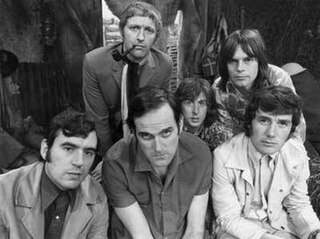
Monty Python were a British comedy troupe formed in 1969 and consisting of Graham Chapman, John Cleese, Terry Gilliam, Eric Idle, Terry Jones, and Michael Palin. The group came to prominence for creating and performing the sketch comedy series Monty Python's Flying Circus (1969–1974). Their work then evolved from the series into a larger and more influential collection that included live shows, films, albums, books, and musicals; their influence on comedy has been compared to the Beatles' influence on music. Regarded as an enduring icon of 1970s pop culture, their sketch show has been referred to as being "an important moment in the evolution of television comedy".

The "Dead Parrot Sketch", alternatively and originally known as the "Pet Shop Sketch" or "Parrot Sketch", is a sketch from Monty Python's Flying Circus about a non-existent species of parrot, called a "Norwegian Blue". A satire on poor customer service, it was written by John Cleese and Graham Chapman and initially performed in the show's first series, in the eighth episode.
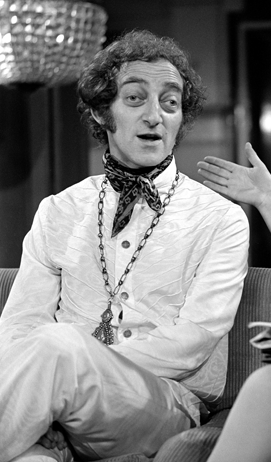
Martin Alan Feldman was a British actor, comedian and comedy writer. He was known for his prominent, misaligned eyes. He initially gained prominence as a writer with Barry Took on the ITV sitcom Bootsie and Snudge and the BBC Radio comedy programme Round the Horne. He became known as a performer on At Last the 1948 Show and Marty, the latter of which won Feldman two British Academy Television Awards including Best Entertainment Performance in 1969.
I'm Sorry, I'll Read That Again was a BBC radio comedy programme that originated from the 1964 Cambridge University Footlights revue, Cambridge Circus. This is a scripted sketch show. It had a devoted youth following, with the live tapings enjoying very lively audiences, particularly when familiar themes and characters were repeated; a tradition that continued into the spinoff show I'm Sorry I Haven't a Clue.

Timothy Julian Brooke-Taylor OBE was an English actor and comedian best known as a member of The Goodies.

At Last the 1948 Show is a satirical television show made by David Frost's company, Paradine Productions, in association with Rediffusion London. Transmitted on Britain's ITV network in 1967, it brought Cambridge Footlights humour to a broader audience.

The Secret Policeman's Ball is a series of benefit shows staged initially in the United Kingdom to raise funds for the human rights organisation Amnesty International. The shows started in 1976 featuring popular British comedians but later included leading musicians and actors. The Secret Policeman's Ball shows are credited by many prominent entertainers with having galvanised them to become involved with Amnesty and other social and political causes in succeeding years.
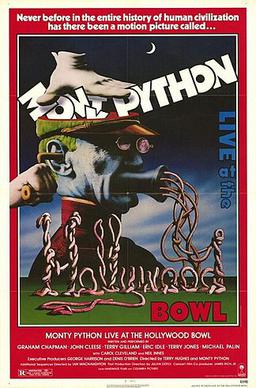
Monty Python Live at the Hollywood Bowl is a 1982 British concert comedy film directed by Terry Hughes and starring the Monty Python comedy troupe as they perform many of their sketches at the Hollywood Bowl. The film also features Carol Cleveland in numerous supporting roles and Neil Innes performing songs. Also present for the shows and participating as an 'extra' was Python superfan Kim "Howard" Johnson.
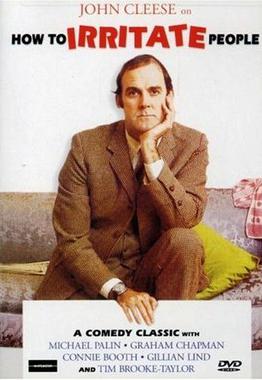
How to Irritate People is a US television broadcast filmed in the UK at LWT on 14 November 1968 and written by John Cleese, Graham Chapman, Marty Feldman and Tim Brooke-Taylor. Cleese, Chapman, and Brooke-Taylor also feature in it, along with future Monty Python collaborators Michael Palin and Connie Booth.

"Argument Clinic" is a sketch from Monty Python's Flying Circus, written by John Cleese and Graham Chapman. The sketch was originally broadcast as part of the television series and has subsequently been performed live by the group. It relies heavily on wordplay and dialogue, and has been used as an example of how language works.

Monty Python Live at City Center is a US-only live album by Monty Python, recorded at the New York City Center in April 1976 and rush released by Arista Records the following month. In order to get the album out in the shops quickly, the recordings were made early on in the run, where some of the performances were affected by faulty microphones. The team were joined onstage by regular actress Carol Cleveland and musician Neil Innes, who also performed in some sketches.
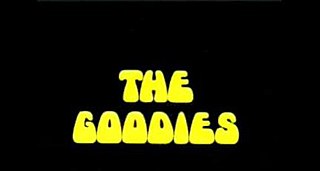
The Goodies is a British television comedy series shown in the 1970s and early 1980s. The series, which combines surreal sketches and situation comedy, was broadcast by the BBC, initially on BBC2 but soon repeated on BBC1, from 1970 to 1980. One seven-episode series was made for ITV company LWT and shown in 1981–82.
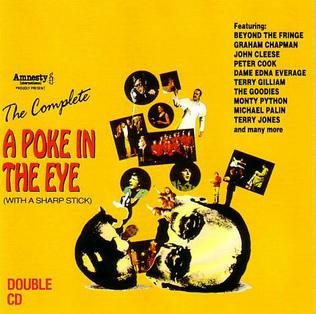
A Poke in the Eye is the title of the first show in what later became the Secret Policeman's Ball series of benefit shows for human rights organization Amnesty International, although it pre-dated by three years the first show to bear that name. The film of the show was titled Pleasure at Her Majesty's which is sometimes mistakenly thought to be the title of the actual benefit show.

Monty Python Live at Aspen was a reunion show featuring the surviving members of the Monty Python team: John Cleese, Terry Gilliam, Eric Idle, Terry Jones and Michael Palin, appearing on stage together for the first time since their Hollywood Bowl shows in 1980. Filmed on 7 March 1998 at the Wheeler Opera House in Colorado as part of The US Comedy Arts Festival, it featured the five Pythons in an interview with host Robert Klein. The late Graham Chapman was also allegedly in attendance as his "ashes" were brought out in an urn with his portrait attached to the front, only to be knocked over by Terry Gilliam.
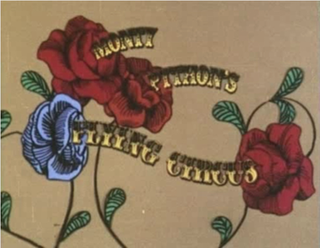
Monty Python's Flying Circus is a British surreal sketch comedy series created by and starring Graham Chapman, John Cleese, Eric Idle, Terry Jones, Michael Palin and Terry Gilliam, who became known collectively as "Monty Python", or the "Pythons". The first episode was recorded at the BBC on 7 September 1969 and premiered on 5 October on BBC1, with 45 episodes airing over four series from 1969 to 1974, plus two episodes for German TV. A feature film adaptation of several sketches, And Now for Something Completely Different, was released in 1971.

Monty Python: Almost the Truth is a 2009 television documentary series in six parts that covers 40 years of the surreal comedy group Monty Python, from Flying Circus to present day projects such as the musical Spamalot. The series highlights their childhood, schooling and university life, and pre-Python work. The series featured new interviews with surviving members John Cleese, Terry Gilliam, Eric Idle, Terry Jones and Michael Palin, alongside archive interview footage of Graham Chapman and interviews with several associates of the Pythons, including Carol Cleveland, Neil Innes and Chapman's partner David Sherlock, along with commentary from modern comedians.

Monty Python Live (Mostly) (also billed as Monty Python Live (Mostly): One Down, Five to Go) was a variety show by the Monty Python comedy group at The O2 in London in July 2014. Planned as a single performance for 1 July, it was expanded to 10 shows due to the high demand for tickets. It was their first live performance together in 16 years, the second without member Graham Chapman (who died in 1989) and the last with Terry Jones (died 2020).
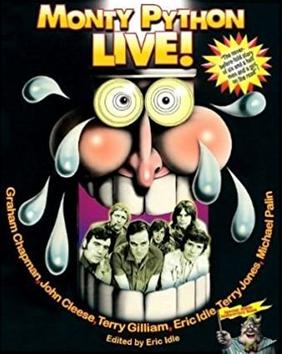
Monty Python Live! is a book detailing the various live performances of the Monty Python team between 1971 and 1980.




















